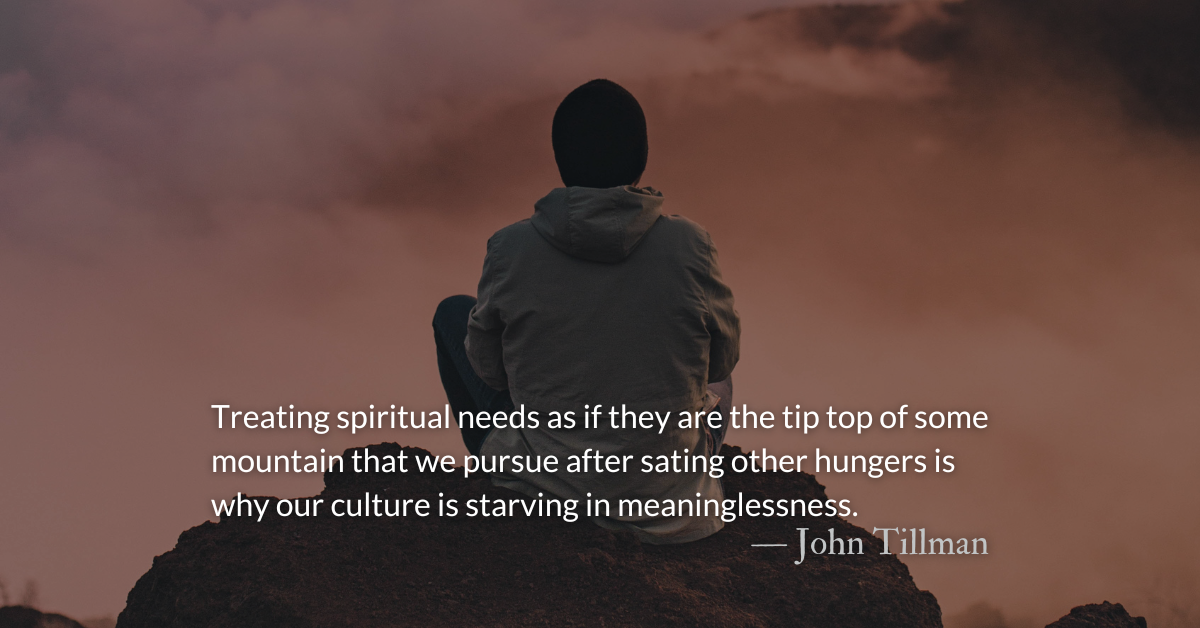Scripture Focus: Ecclesiastes 6.7-12
7 Everyone’s toil is for their mouth,
yet their appetite is never satisfied.
8 What advantage have the wise over fools?
What do the poor gain
by knowing how to conduct themselves before others?
9 Better what the eye sees
than the roving of the appetite.
This too is meaningless,
a chasing after the wind.
10 Whatever exists has already been named,
and what humanity is has been known;
no one can contend
with someone who is stronger.
11 The more the words,
the less the meaning,
and how does that profit anyone?
12 For who knows what is good for a person in life, during the few and meaningless days they pass through like a shadow? Who can tell them what will happen under the sun after they are gone?
Reflection: More Money, More Problems
By John Tillman
Jim Carrey has said, “I think everybody should get rich and famous and do everything they ever dreamed of so they can see that it’s not the answer.”
A popular social media meme shows a person quoting the truism, “Money will not fix all your problems,” and a reply saying, “…no offense but…I don’t have a single problem money wouldn’t solve.”
Notorious BIG’s hit song tells us, “…the more money we come across, the more problems we see.”
The teacher of Ecclesiastes shows us that Carrey’s quote, the meme, and the lyric hold truth.
Ecclesiastes describes and laments the struggles of the poor, recognizing that wealth makes life more comfortable and poverty crushes the spirit. However, the teacher has experienced exactly what Carrey and BIG describe. Wealth and pleasure beyond anyone’s dreams came to the teacher, yet his spirit was still crushed with meaninglessness. Wealth does solve problems, but soon deeper problems are revealed.
Maslow’s hierarchy of needs is visualized as a pyramid. Basic needs, such as food and shelter, are the bottom, and higher-order needs are the top. This visual metaphor communicates that basic needs must be met before “climbing” up to pursue higher needs. However, this imagery may give a false impression that higher “spiritual” needs are less substantive or important.
Treating spiritual needs as if they are the tip top of some mountain that we pursue after sating other hungers is why our culture is starving in meaninglessness.
Spiritually, the base of our pyramid is to live not on bread but on every word that comes from the mouth of God. (Matthew 4.4; Deuteronomy 8.3) This basic hunger of our soul has only one source—the teachings of Christ. “For the bread of God is the bread that comes down from heaven and gives life to the world.” (John 6.33) Physical need points to spiritual need. This is why we fast and pray. Physical lack reminds us of our spiritual lack and God’s grace to us in both.
Wealth doesn’t solve all problems or fill our deepest spiritual needs. That doesn’t mean telling the poor, “Money won’t solve your problems. Try Jesus.” (Mark 7.11-13) But it does mean that those who look like they have it all often are spiritually starving to death.
Problems, physical or spiritual, are inroads for the gospel. The more problems we come across, the more need of God we see.
Divine Hours Prayer: The Call to Prayer
Love the Lord, all you who worship him; the Lord protects the faithful, but repays to the full those who act haughtily. — Psalm 31.23
– From The Divine Hours: Prayers for Summertime by Phyllis Tickle.
Today’s Readings
Ecclesiastes 6 (Listen 1:44)
Psalm 56-57 (Listen 2:11)
Read more about Artful Prayers
In the psalms, we enter the lived emotion of artists who bared their souls to God in prayers that were always intended to be performed.
Read more about Pause To Read
After a short hiatus, our podcast is back with an episode on what we can learn from Jesus’ hotheaded disciples. Don’t miss it.









